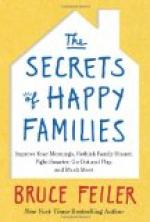Happy Jack, hungry and quite unconscious that he was riding straight into the trail of trouble, galloped around a ragged point of service-berry bushes, stopped with a lurch at the prostrate corral and unsaddled hastily. Those in the shade of the willow watched him, their very silence proclaiming loudly their interest. They might have warned him by a word, but they did not; for Happy Jack was never eager to heed warnings or to take advice, preferring always to abide by the rule of opposites. Stiff-legged from long riding, the knees of his old, leather chaps bulging out in transient simulation of bowed limbs, he came clanking down upon the cook-tent with no thought but to ease his hunger.
Those who watched saw him stoop and thrust his head into the tent, heard a bellow and saw him back out hastily. They chuckled unfeelingly and strained ears to miss no word of what would follow.
“Aw, gwan!” Happy Jack expostulated, not yet angry. “I got here quick as I could—and I ain’t heard nothing about no new laws uh getting here when the whistle blows. Gimme what there is, anyhow.”
Some sentences followed which, because of guttural tones and German accent emphasized by excitement, were not quite coherent to the listeners. However, they did not feel at all mystified as to his meaning—knowing Patsy as they did.
“Aw, come off! Somebody must uh slipped yuh a two-gallon jug uh something. I’ve rode the range about as long as you’ve cooked on it, and I never knowed a man to go without his supper yet, just because he come in late. I betche yuh dassent stand and say that before Chip, yuh blamed old Dutch—” Just there, Happy Jack dodged and escaped getting more than a third of the basin of water which came splashing out of the tent.
The group under the willows could no longer lie at ease while they listened; they jumped up and moved closer, just as a crowd always does surge nearer and nearer to an exciting centre. They did not, however, interfere by word or deed.
“If yuh wasn’t just about ready t’ die of old age and general cussedness,” stormed Happy Jack, “I’d just about kill yuh for that.” This, however, is a revised version and not intended to be exact. “I want my supper, and I want it blame quick, too, or there’ll be a dead Dutchman in camp. No, yuh don’t! You git out uh that tent and lemme git in, or—” Happy Jack had the axe in his hand by then, and he swung it fearsomely and permitted the gesture to round out his sentence.
Perhaps there would have been something more than words between them, for even a Happy Jack may be goaded too far when he is hungry; but Chip, who had been washing out some handkerchiefs down by the creek, heard the row and came up, squeezing a ball of wet muslin on the way. He did not say much when he arrived, and he did not do anything more threatening than hang the handkerchiefs over the guy-ropes to dry, tying the corners to keep the wind from whipping them away up the coulee, but the result was satisfying—to Happy Jack, at least. He ate and was filled, and Patsy retired from the fray, sullenly owning defeat for that time at least. He went up the creek out of sight from camp, and he stayed there until the dusk was so thick that his big, white-aproned form was barely distinguishable in the gloom when he returned.




